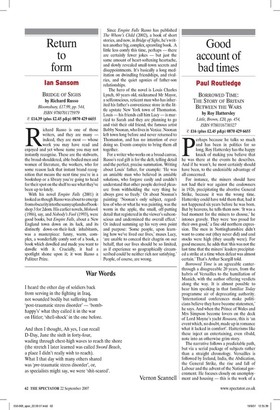Return to form
Ian Sansom BRIDGE OF SIGHS by Richard Russo Bloomsbury, £17.99, pp. 544, ISBN 9780701175979 £1439 (plus £2.45 p&p) 0870 429 6655 Richard Russo is one of those writers, and they are many — indeed, they are most — whose work you may have read and enjoyed and yet whose name you may not instantly recognise. These are the stalwarts, the broad-shouldered, able-bodied men and women of literature, the workers, who for some reason lack that instant brand recognition that means the next time you're in a bookshop or a library you're going to head for their spot on the shelf to see what they've been up to lately.
With his novel Empire Falls (2001) it looked as though Russo was about to emerge from obscurityinto the sunnyuplands ofbookshop 3 for 2dom. His earlier novels, Mohawk (1986), say, and Nobody's Fool (1993), were good books, but Empire Falls, about a New England town down on its luck, and its distinctly down-on-their-luck inhabitants, was a masterpiece: funny, warm, complex, a wonderfully comfy sort of a book, a book which dawdled and made you want to dawdle with it. Crucially, it had a spotlight shone upon it; it won Russo a Pulitzer Prize.
Since Empire Falls Russo has published The Whore's Child (2002), a book of short stories, and now, in Bridge of Sighs, he's written another big, complex, sprawling book. A little less comfy this time, perhaps — there are certainly fewer jokes — but just the same amount of heart-softening heartache, and slowly revealed small-town secrets and disappointments. It's basically a long meditation on dwindling friendships, and rivalries, and the quiet agonies of father-son relationships.
The hero of the novel is Louis Charles Lynch, 60 years old, nicknamed Mr Mayor, a selfconscious, reticent man who has inherited his father's convenience store in the little upstate New York town of Thomaston. Louis — his friends call him Lucy — is married to Sarah and they are planning to go and visit their old friend, the famous artist Bobby Noonan, who lives in Venice. Noonan left town long before and never returned to Thomaston, and has no intention of ever doing so. Events conspire to bring them all together.
For a writer who works on a broad canvas, Russo's real gift is for the deft, telling detail and the perfect, precise summation. Writing about Louis' father, for example: 'He was an amiable man who believed in amiable solutions, who forgave easily and couldn't understand that other people derived pleasure from withholding the very thing he always gave so freely.' Or about Noonan's painting: 'Noonan's only subject, regardless of who or what he was painting, was the worm in the apple, the small, off-putting detail that registered in the viewer's subconscious and undermined the overall effect.' Or indeed summing up his very own point and purpose: 'Some people, upon learning how we've lived our lives,' muses Lucy, 'are unable to conceal their chagrin on our behalf, that our lives should be so limited, as if experience so geographically circumscribed could be neither rich nor satisfying.' People, of course, are wrong.

































































 Previous page
Previous page